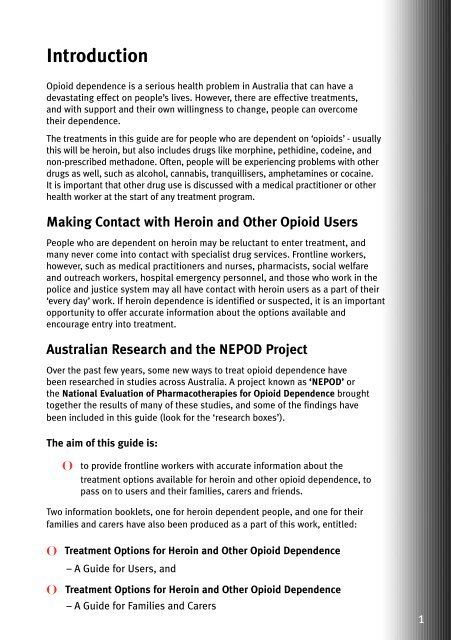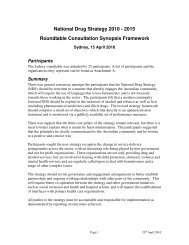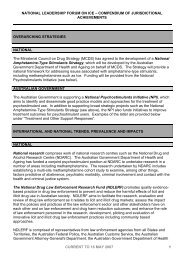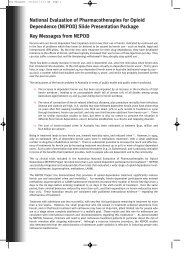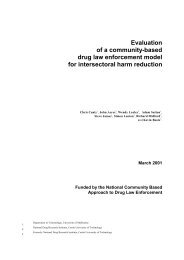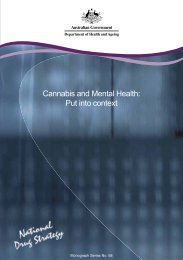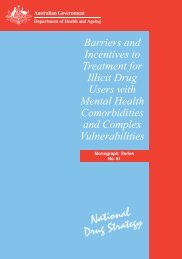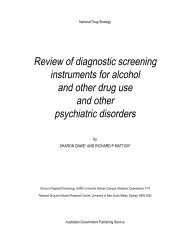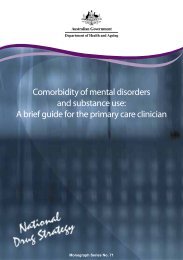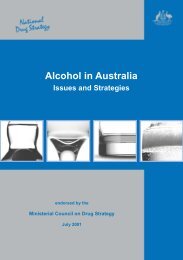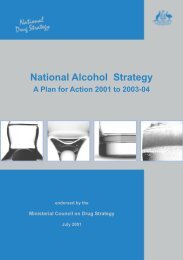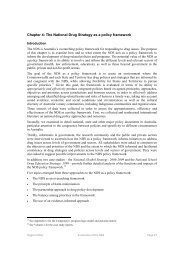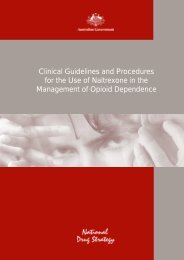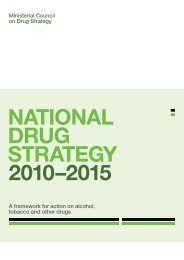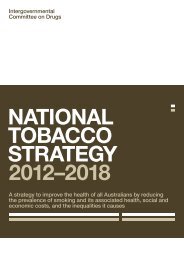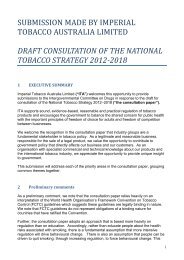A Guide for Frontline Workers - National Drug Strategy
A Guide for Frontline Workers - National Drug Strategy
A Guide for Frontline Workers - National Drug Strategy
Create successful ePaper yourself
Turn your PDF publications into a flip-book with our unique Google optimized e-Paper software.
Introduction<br />
Opioid dependence is a serious health problem in Australia that can have a<br />
devastating effect on people’s lives. However, there are effective treatments,<br />
and with support and their own willingness to change, people can overcome<br />
their dependence.<br />
The treatments in this guide are <strong>for</strong> people who are dependent on ‘opioids’ - usually<br />
this will be heroin, but also includes drugs like morphine, pethidine, codeine, and<br />
non-prescribed methadone. Often, people will be experiencing problems with other<br />
drugs as well, such as alcohol, cannabis, tranquillisers, amphetamines or cocaine.<br />
It is important that other drug use is discussed with a medical practitioner or other<br />
health worker at the start of any treatment program.<br />
Making Contact with Heroin and Other Opioid Users<br />
People who are dependent on heroin may be reluctant to enter treatment, and<br />
many never come into contact with specialist drug services. <strong>Frontline</strong> workers,<br />
however, such as medical practitioners and nurses, pharmacists, social welfare<br />
and outreach workers, hospital emergency personnel, and those who work in the<br />
police and justice system may all have contact with heroin users as a part of their<br />
‘every day’ work. If heroin dependence is identified or suspected, it is an important<br />
opportunity to offer accurate in<strong>for</strong>mation about the options available and<br />
encourage entry into treatment.<br />
Australian Research and the NEPOD Project<br />
Over the past few years, some new ways to treat opioid dependence have<br />
been researched in studies across Australia. A project known as ‘NEPOD’ or<br />
the <strong>National</strong> Evaluation of Pharmacotherapies <strong>for</strong> Opioid Dependence brought<br />
together the results of many of these studies, and some of the findings have<br />
been included in this guide (look <strong>for</strong> the ‘research boxes’).<br />
The aim of this guide is:<br />
O to provide frontline workers with accurate in<strong>for</strong>mation about the<br />
treatment options available <strong>for</strong> heroin and other opioid dependence, to<br />
pass on to users and their families, carers and friends.<br />
Two in<strong>for</strong>mation booklets, one <strong>for</strong> heroin dependent people, and one <strong>for</strong> their<br />
families and carers have also been produced as a part of this work, entitled:<br />
O Treatment Options <strong>for</strong> Heroin and Other Opioid Dependence<br />
– A <strong>Guide</strong> <strong>for</strong> Users, and<br />
O Treatment Options <strong>for</strong> Heroin and Other Opioid Dependence<br />
– A <strong>Guide</strong> <strong>for</strong> Families and Carers<br />
1


